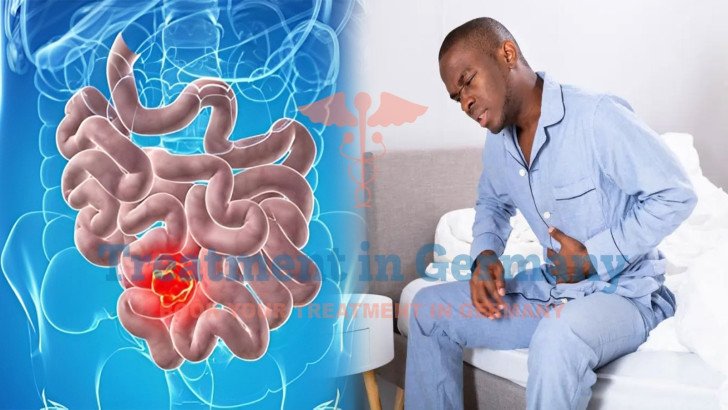
Duodenal cancer is a rare but serious malignancy that develops in the first portion of your small intestine (duodenum), accounting for less than 1% of all gastrointestinal cancers [3].
Duodenal cancer, a rare malignancy affecting the first part of the small intestine, requires advanced therapeutic approaches to improve outcomes for duodenal cancer patients. Germany, a global leader in advanced duodenal cancer treatment, offers innovative cancer treatment options, cutting-edge diagnostics, and multidisciplinary care, attracting patients worldwide.
Duodenal cancer, primarily adenocarcinoma, originates in the duodenum, the initial segment of the small intestine responsible for nutrient absorption. Risk factors include chronic inflammation (e.g., Crohn’s disease), genetic syndromes like familial adenomatous polyposis (FAP), and lifestyle factors such as obesity or smoking. Early-stage duodenal cancer is often asymptomatic, complicating timely detection, while advanced cases may spread to lymph nodes or the liver. Germany’s hospitals and cancer centers excel in delivering innovative duodenal cancer treatments, integrating surgery, targeted therapy, and immunotherapy to optimize outcomes for duodenal cancer patients.
Recognizing duodenal cancer symptoms is crucial for early intervention. Common signs include:
These symptoms may mimic less severe conditions like ulcers, making diagnosis critical. German specialists use advanced diagnostics to identify duodenal cancer promptly, improving treatment outcomes.
Diagnosis of Duodenal Cancer in Germany
Accurate diagnosis is the foundation of effective duodenal cancer treatment. German hospitals employ state-of-the-art diagnostic tools to confirm duodenal cancer and guide therapy:
German radiologists and pathologists ensure precise diagnosis, enabling tailored cancer treatment options for duodenal cancer patients.
Latest Treatment Options for Duodenal Cancer
Germany’s advanced duodenal cancer treatment landscape offers a range of latest treatment options tailored to the tumor’s stage and molecular profile. Cancer centers combine conventional and experimental therapies to address this rare malignancy.
Surgical Interventions for Duodenal Cancer
Surgery is the primary curative approach for resectable duodenal cancer. German surgeons perform advanced procedures, including:
Intraoperative imaging enhances precision, improving anti-tumor outcomes for duodenal cancer patients.
Chemotherapy and Targeted Therapy
For advanced or unresectable duodenal cancer, Germany offers systemic therapies:
German oncologists personalize these treatments, optimizing duodenal cancer treatment efficacy.
Immunotherapy Advances
Immunotherapy is an emerging new treatment option for duodenal cancer:
German immunologists leverage clinical trials to explore immunotherapy, offering hope for duodenal cancer patients with resistant disease.
Role of Clinical Trials
Germany’s leadership in clinical trials for duodenal cancer provides access to novel cancer treatment options, often unavailable in the UK or US. These trials investigate combinations of immunotherapy, targeted therapy, and gene-based treatments, showing potential to extend survival. German cancer centers drive global research, advancing innovative duodenal cancer treatments.
Why Germany Excels in Duodenal Cancer Treatment
Germany offers distinct advantages for duodenal cancer patients seeking advanced duodenal cancer treatment:
Risk Factors and Prevention of Duodenal Cancer
Preventing duodenal cancer complements treatment efforts. Key risk factors include:
German specialists recommend managing chronic conditions, quitting smoking, and regular screenings (endoscopy, CT scans) for high-risk individuals to reduce duodenal cancer risk.
Multidisciplinary Cancer Treatment for Duodenal Cancer
Germany’s multidisciplinary cancer treatment approach ensures comprehensive care for duodenal cancer:
This integrated strategy, led by German surgeons and oncologists, maximizes duodenal cancer treatment efficacy.
Post-Treatment Care and Quality of Life
Following duodenal cancer treatment, German cancer centers provide robust follow-up care:
Germany’s patient-centered approach ensures duodenal cancer patients achieve sustained recovery.
Challenges and Future Innovations
Duodenal cancer treatment faces challenges, including late diagnosis and tumor resistance to therapies. German researchers address these through:
Future advancements may include universal immunotherapy platforms and precision medicine, expanding latest treatment options.
Conclusion
Germany’s expertise in duodenal cancer treatment is transforming care for duodenal cancer patients, offering a comprehensive guideline for latest treatment options, symptoms, and diagnosis. Through advanced duodenal cancer treatment strategies, including targeted therapy, immunotherapy, and clinical trials, Germany delivers personalized, innovative care. German cancer centers, supported by the expertise of doctors and state-of-the-art technology, ensure optimal anti-tumor outcomes and quality of life. As a global leader in innovative duodenal cancer treatments, Germany provides hope and healing for duodenal cancer patients, combining scientific excellence with compassionate support.
🌍Why Patients Worldwide Prefer Our Medical Services in Germany – Key Benefits Explained:
Frequently Asked Questions
What are the latest treatment options for duodenal cancer in Germany?
They include multidisciplinary cancer treatment with surgery, targeted therapy, and immunotherapy, offered at top German cancer centers.
What are common duodenal cancer symptoms?
Symptoms include abdominal pain, weight loss, jaundice, and nausea, requiring prompt diagnosis.
How is duodenal cancer diagnosed in Germany?
Through endoscopy, CT scans, blood tests, and molecular profiling at German hospitals.
Are clinical trials for duodenal cancer available in Germany?
Yes, German cancer centers offer trials exploring immunotherapies and targeted therapies.
Is follow-up care provided after duodenal cancer treatment in Germany?
Yes, including MRI, rehabilitation, and emotional support.
How does Germany compare to the UK/US for duodenal cancer treatment?
Germany excels in innovative duodenal cancer treatments, faster access, and holistic care.
Can duodenal cancer treatment prevent recurrence?
Targeted therapies and immunotherapy reduce recurrence risk by targeting residual cancer cells.
Does Germany support international duodenal cancer patients?
Hospitals in Germany offer language assistance, travel coordination, and psychological support.
What are the latest advancements in duodenal cancer treatment in Germany?
Germany pioneers immunotherapy advancements and AI-driven diagnostics for duodenal cancer.
How does duodenal cancer treatment differ from standard chemotherapy?
Unlike chemotherapy, targeted therapies and immunotherapy offer precise anti-tumor outcomes with fewer side effects, enhancing quality of life.
For more information or a free consultation, visit our contact us page.
Kindly complete the form below, and our dedicated team will reach out to you promptly. We look forward to connecting with you soon!
Trierer Straße, 56072 Koblenz, Germany

.webp)
 (1).webp)

.webp)
 (1).webp)


.webp)
 (1).webp)

.webp)
 (1).webp)
